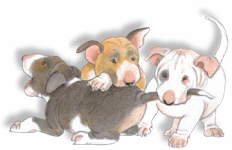|

You've got a great female pedigree dog with papers, and you figure you can make some extra cash if she has puppies. You think that to breed her, all you have to do is mate her with a stud, and a few months later she'll go into the closet and have puppies.
According to Dr. Thomas Graves, breeder, dog show judge, and veterinary internist at the University of Illinois Veterinary Teaching Hospital in Urbana, these are just a few misconceptions about breeding dogs. He explains that proper breeding requires time, money, education, and experience, and often yields little or no financial profit. Also, since pet overpopulation is a growing problem, he believes dogs should not be bred unless there's good reason.
Dr. Graves cites the following inappropriate reasons to breed a bitch:
- You want to make extra money. If you do a good job breeding, you don't make much money. Proper veterinary prenatal and postnatal care costs money, and, according to Dr. Graves, hobby breeders
don't make huge profits, if any at all.
- You heard motherhood can "calm" a bitch's behavior problem. "Simply not true," says Dr. Graves.
- You think witnessing whelping is a good experience for kids. There are other ways to educate and involve children in the miracle of birth that do not result in unwanted puppies.
- You simply want puppies. Breeding just to bring more puppies into the world can contribute to the growing dog overpopulation problem.
According to the Humane Society of the United States, 3 million to 4 million unwanted dogs and cats are euthanized each
year - about 25 percent of which are purebred. Adoption is a better option.
Obviously there has to be some breeding, because without breeding, there would be no puppies to grow up into
dogs - and who wants a world without dogs?
Dr. Graves says that good reasons to breed a bitch include: to perpetuate good qualities of a certain breed of dogs and to perpetuate a specific breed. Specific breeds create dogs for specific purposes or for show, so if certain qualities or breeds are in demand, the puppies you breed can find a good home.

If you are seriously considering breeding, there are several steps to the process. First, determine if your bitch is the quality to be bred. Every breed has a standard listed by the American Kennel Club at www.akc.org. If your bitch fits her breed standards, the next step is to get her examined by a veterinarian for her suitability for pregnancy and for inheritable abnormalities. Aside from making pregnancy and whelping difficult, health problems can be passed on to puppies, perpetuating unhealthy traits in a breed.
If your dog has good traits you want to pass on, fits her breed standard, and is healthy, you should educate yourself about breeding by reading, attending dog shows, and talking to reputable breeders. If you decide to try breeding, find a reputable breeder to mentor you, and develop a relationship with a veterinarian you can call on for pregnancy and whelping problems.
Getting a bitch pregnant is not simple. You must choose a stud dog according to his desirable traits and check his pedigree (his family tree) to avoid inbreeding and inheritable defects or disease. Estrus varies from breed to breed and individual to individual, so timing of mating is crucial to ensure pregnancy. Dr. Graves says that most cases of "infertility" in bitches are actually due to timing problems--either mating too early or too late. To ensure pregnancy, mating may have to be repeated regularly during the female's estrus.
Many people believe that having babies is a "natural process" and assume dogs shouldn't have problems during pregnancy or whelping. Dr. Graves explains that, on the contrary, purebred dogs have been unnaturally selected, so some of these "man-made" breeds may be prone to complications. It's very common to lose puppies during whelping, and to minimize this loss, a breeder works with a veterinarian to learn how to identify and handle problems during whelping.
Breeding a bitch is not a light undertaking; it is more than a hobby, yet doesn't yield profits like a business, so breeders must have time, money, and plenty of energy to invest.
Written by Kim Marie Labak
Information Specialist
University of Illinois
College of Veterinary Medicine
|